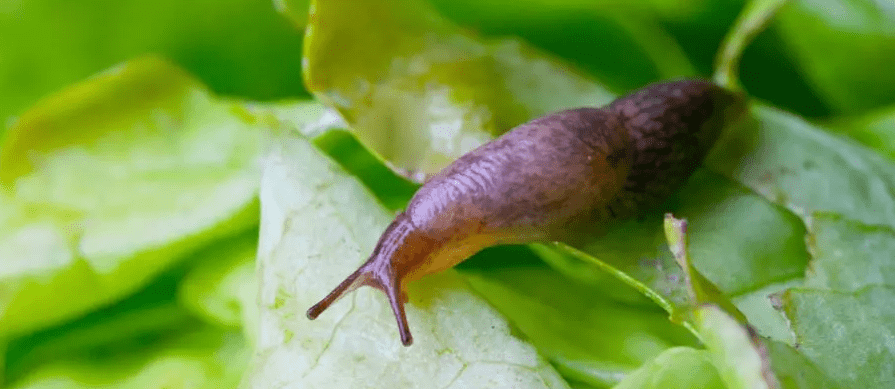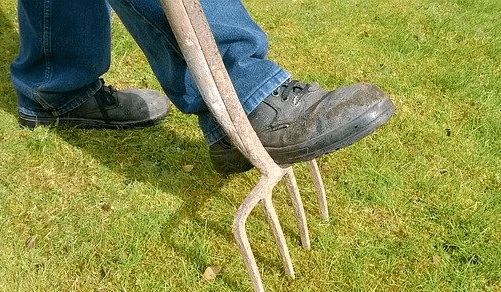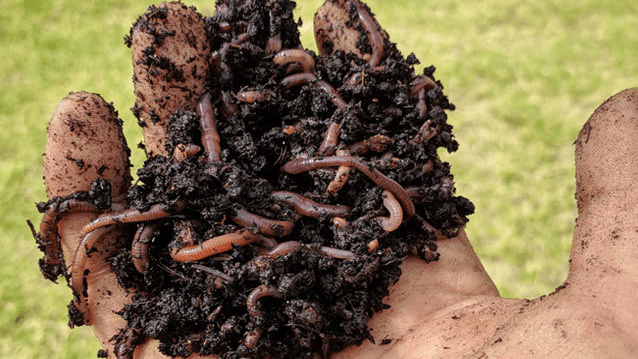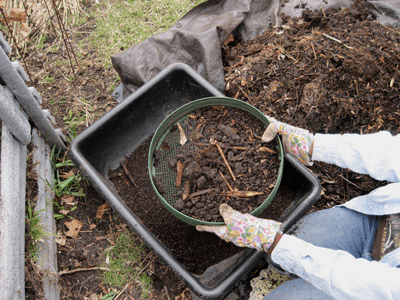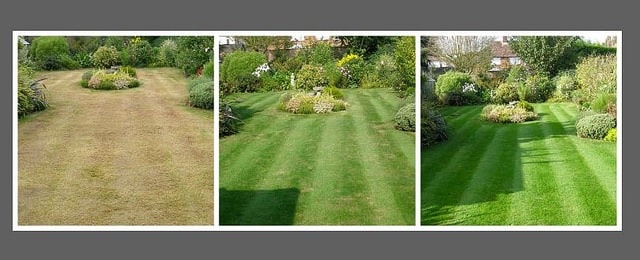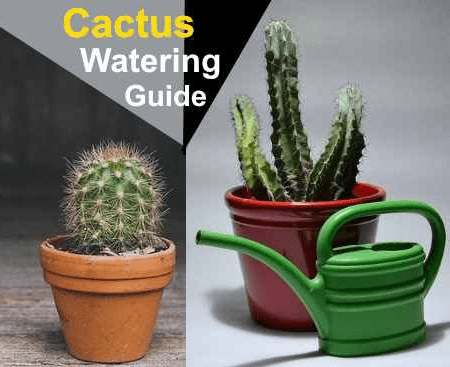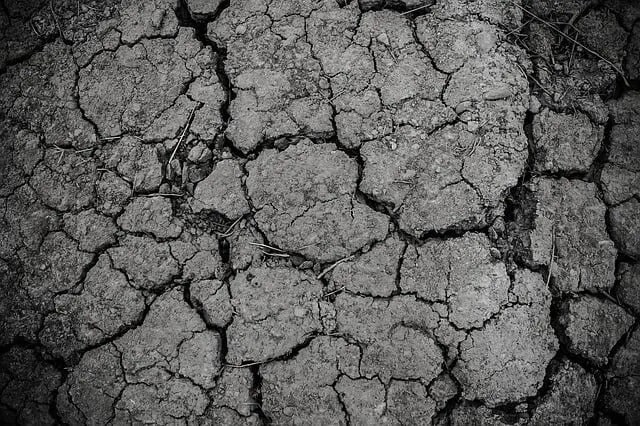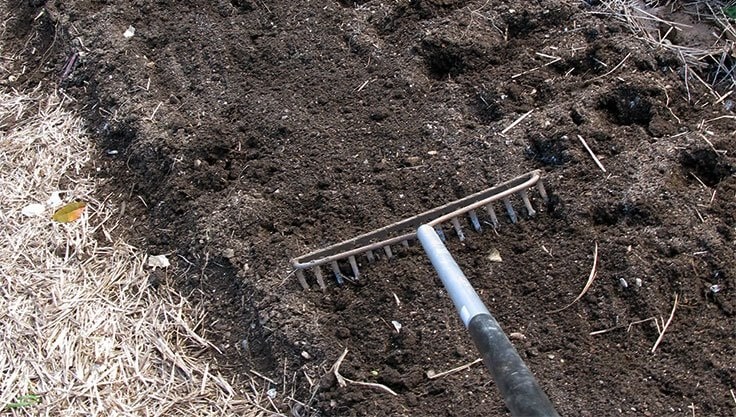As a passionate gardener, I’ve learned that roses aren’t just beautiful—they’re also quite demanding when it comes to nutrients. Over the years, I’ve come to understand how important the right rose fertilizer is for achieving healthy growth and stunning blooms. In this article, I’ll walk you through the different types of rose fertilizers, when to use them, and how to get the most out of your roses with proper feeding.
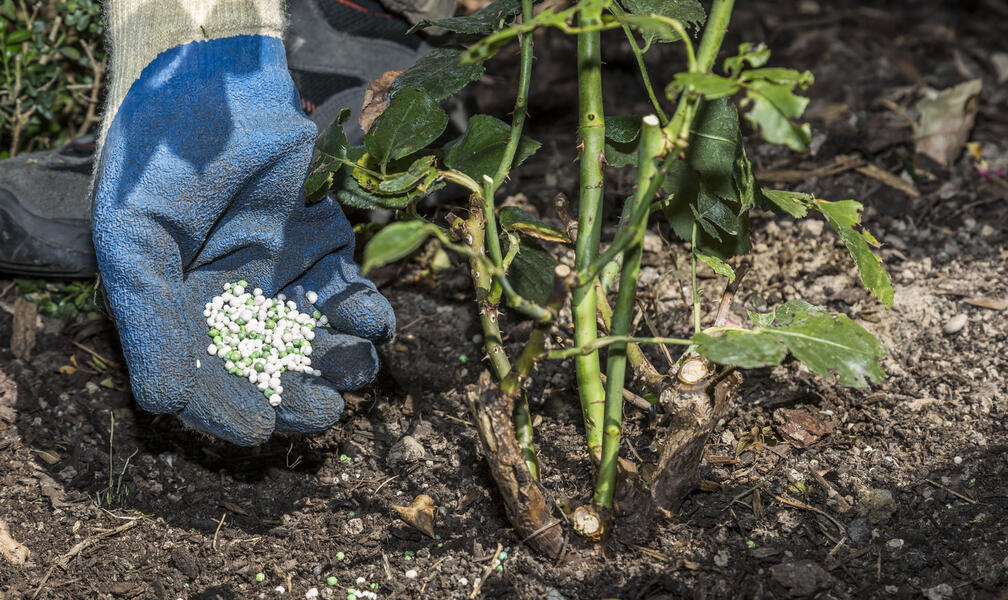
Used correctly, rose fertilizers can lead to lush blooms. Here’s a guide to which fertilizers are best for your roses and how to apply them properly.
Roses are heavy feeders and love to be pampered. If you want abundant blooms, you’ll need to feed them with the right rose fertilizer—at the right time. Below, you’ll find an overview of the different types of rose fertilizers and learn when and how to use them effectively.
Contents
When Should You Fertilize Roses with Rose Fertilizer?
The more a plant blooms, the more nutrients it needs. Many roses—especially repeat-blooming varieties—flower twice a year. After the first flush in June, there’s a short pause before a second round of flowers appears on new growth later in summer. Whether it’s a hybrid tea rose, climbing rose, or groundcover rose, all roses should be fertilized twice a year: once at the end of March and again at the end of June. Repeat bloomers should also be lightly pruned in June.
Have you just planted a new rose in your garden? Then skip the March fertilization and feed the plant for the first time in June. Why? A freshly planted rose needs to establish its roots and should focus its energy on root development rather than flowering. If your soil is heavy clay, it’s even better to avoid fertilizing during the first year altogether. In nutrient-rich clay soils, fertilizing every two years is often sufficient. Too much fertilizer can be just as harmful to roses as too little.
What Nutrients Do Roses Need?
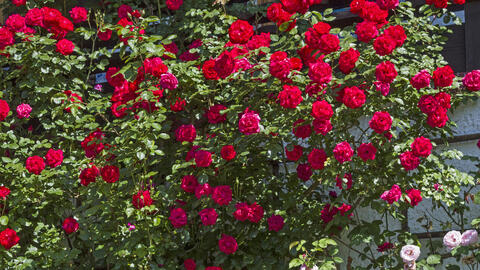
Early in the year, roses need nitrogen and phosphorus to support leaf growth and flower formation. Later in the season, potassium helps strengthen the stems, making them more winter-hardy. In summer, nitrogen levels should be kept low, and fertilizers should act quickly. Rose fertilizers are complete fertilizers, containing all essential macronutrients and many micronutrients. However, fast-acting mineral fertilizers can be problematic in soils already high in phosphorus—common in many gardens.
Differences Between Mineral and Organic Rose Fertilizers
Mineral rose fertilizers work quickly and can come with a synthetic resin coating that allows them to release nutrients over several months. Since summer fertilization needs to act fast, many gardeners turn to mineral fertilizers like “Blaukorn” (a blue granulated fertilizer). But be cautious—overfertilizing is a real risk.
Organic rose fertilizers, on the other hand, release nutrients slowly over months, making them ideal for spring and beneficial for the soil due to their humus content. However, in summer, organic fertilizers can lead to soft, frost-sensitive growth, which can be problematic come winter. That’s why organic fertilizers are best suited for spring, and mineral or organic-mineral blends are preferable in summer.
Like all flowering plants, roses need a good amount of phosphorus—not only for blooming but also for their energy metabolism. If a soil test shows that phosphorus and potassium levels are already high, it’s best to fertilize only with horn shavings. Granular fertilizers should be spread around the base of the rose, lightly worked into the soil with a hand cultivator, and thoroughly watered afterward.
Key Rose Fertilizers at a Glance
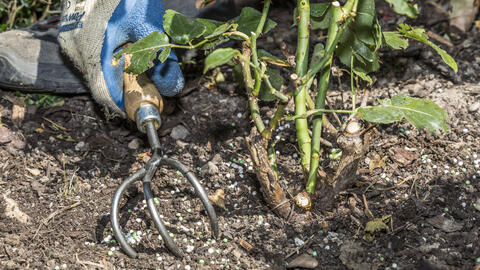
With so many rose fertilizers available, here are some of the most common types:
Special Rose Fertilizers
These have an optimal nutrient balance tailored specifically for roses and act as an all-in-one solution. They can also be used for other flowering shrubs. However, because they’re often high in nutrients—especially the mineral-based ones—there’s a risk of overfertilization. Always follow the manufacturer’s instructions carefully and, if in doubt, use a bit less rather than too much.
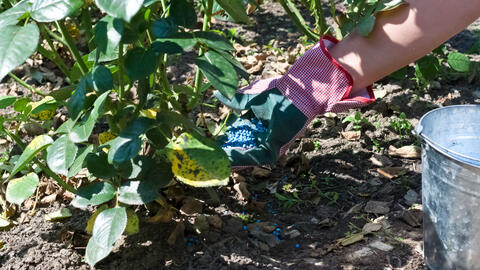
Blaukorn (Blue Fertilizer Granules)
Blaukorn is a purely mineral, highly concentrated general-purpose fertilizer. For roses, it’s best used in summer—at a lower dosage than recommended. Never exceed 25 grams per square meter.
Cattle Manure and Other Animal Manures
Well-rotted animal manure is a popular organic fertilizer for roses. It must be well-composted, or its salt content could be too high. With roughly 2% nitrogen, 1.5% phosphate, and 2% potassium, cattle manure is ideal for roses.
Compost
A garden all-rounder, compost is also a good organic fertilizer for roses—if it’s mature and fully broken down. Mix it lightly into the soil in spring, and combine it with horn shavings for best results.
Horn Shavings (Hornspäne)
Horn shavings are another good fertilizer option for roses. They act slowly and mainly provide nitrogen, making them suitable for spring application. Tip: use finer horn meal instead of shavings—it releases nitrogen more quickly.
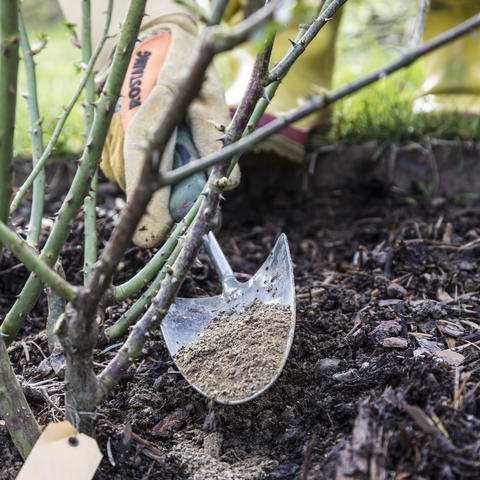
What’s the Best Rose Fertilizer for Potted Roses?
Potted roses have limited soil volume and can’t store much fertilizer, so they need nutrients that act quickly. Plus, potting soil lacks the microorganisms that help break down and release nutrients from organic matter—so organic fertilizers may not work as well in containers.
Liquid fertilizers are the best choice for potted roses. These are mostly mineral-based, but there are also fast-acting liquid organic options. Since they don’t contain solid matter, they don’t improve soil structure but do supply nutrients quickly. Simply mix the liquid fertilizer into your watering can according to the product instructions and apply it weekly, bi-weekly, or monthly—depending on the brand. Stop fertilizing by mid-July.
Alternatively, you can insert a fertilizer cone into the soil in March. These slow-release mineral cones provide nutrients for up to four months.
Taking care of roses has taught me that timing and the right fertilizer make all the difference. Whether you’re using organic compost, mineral-based options, or caring for potted roses with liquid feed, choosing the right product and applying it properly will reward you with vibrant, healthy plants. I hope my experience helps you give your roses exactly what they need to thrive.


